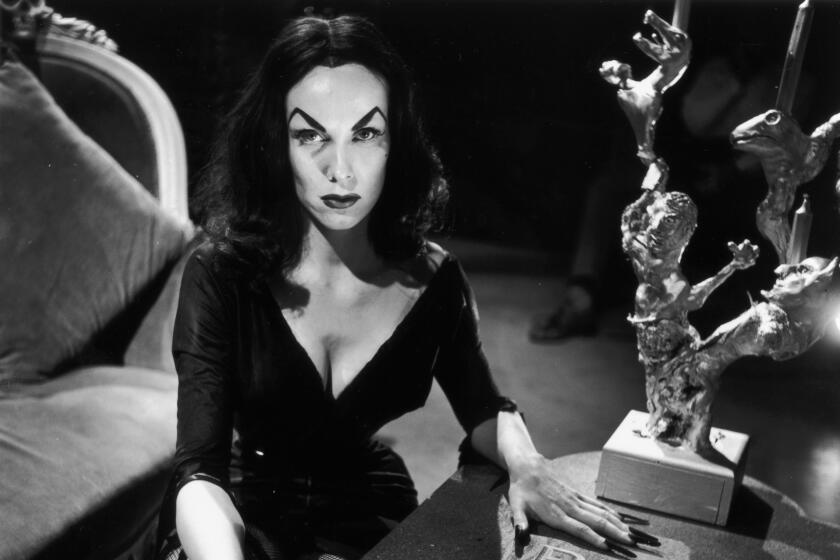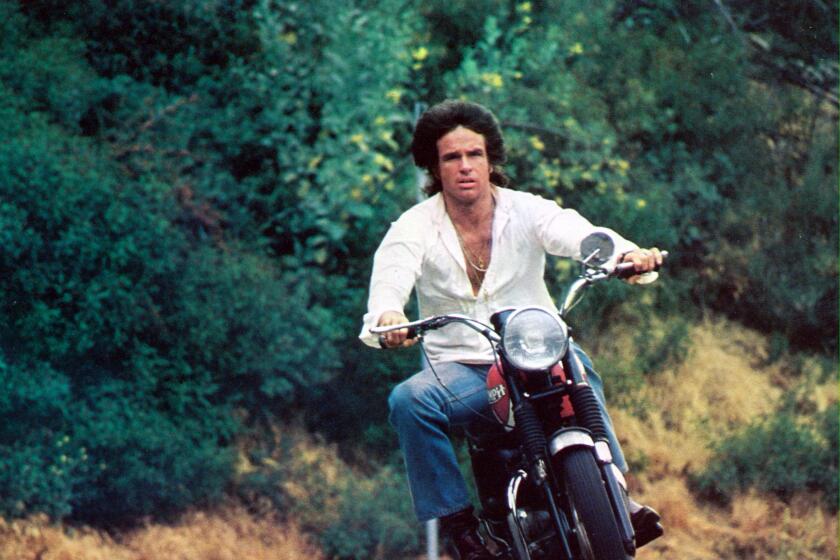James Ellroy talks titillating new tabloid Tinseltown thriller
- Share via
On the Shelf
Widespread Panic
By James Ellroy
Knopf: 336 pages, $28
If you buy books linked on our site, The Times may earn a commission from Bookshop.org, whose fees support independent bookstores.
Freddy Otash, the human train wreck at the heart of James Ellroy’s new novel, “Widespread Panic,” has a confession to make. Many confessions, actually. At least that’s how Ellroy, the dean of Los Angeles crime novelists, would have it.
For the record:
8:54 a.m. June 10, 2021An earlier version of this story mis-identified Lana Turner as Veronica Lake in reference to a scene in the movie “L.A. Confidential.”
In real life, Otash was a corrupt L.A. cop-turned-Hollywood fixer, a phone bugger, scandalmonger and strong arm for the tabloid sheet Confidential. He did a lot of dirty work. (He was also reportedly the inspiration for Jake Gittes, the in-over-his-head detective in “Chinatown.”) Otash died in 1992, but now, Ellroy, whose fever dream novels place real-life figures in all manner of compromising positions, has brought him back to the spotlight.
In the novel’s spiritual conceit, Otash is stuck in purgatory; he has to spill it all if he wants a chance to enter the place up above.
It doesn’t sound like Ellroy would make a good reference.
“Freddy was a sack of s—,” Ellroy says by phone from his Denver home. “He was a shakedown artist. He wrecked lives.”
He was also in business with Ellroy, after a fashion. The author originally wanted to make Otash the antihero of the 1995 novel “American Tabloid,” counting him in on the assassination of President John F. Kennedy. Otash agreed — in return for a cash payment — not to publicly contradict anything Ellroy might write.
But Ellroy, now 73, didn’t trust Otash, so he scotched the deal and created a different “Tabloid” protagonist. “Fred was making a lot of ancillary dough then, appearing on tabloid TV shows like ‘Inside Edition,’” Ellroy says. “He was getting 7,500 bucks a pop to talk about JFK’s womanizing, James Dean, the inner workings of Confidential.”
Now, Fred’s dead and that’s all water under the aqueduct.
If you were a star in real life and you become a character in an Ellroy novel, chances are you’re no longer alive to complain. His body of work is a long danse macabre between fiction and reality. The costars of “Widespread Panic” include Dean, Rock Hudson, Elizabeth Taylor, Kennedy and Ingrid Bergman. None of them is up to any good.
In “Glamour Ghoul,” a niece of Maila Nurmi — better known as Vampira — documents the exciting, fraught Hollywood life of a bygone horror camp icon.
The funniest scene in the obscenely entertaining 1997 movie adaptation of Ellroy’s “L.A. Confidential” finds an LAPD detective mistaking Lana Turner for a prostitute surgically altered to look like Lana Turner. (The detective gets a drink thrown in his face for his mistake.) It’s a mischievous encapsulation of the Ellroy effect, which invites you to conflate the historical with the imaginary under the most salacious circumstances possible.
Ellroy says it’s all part of his shadow history of Los Angeles, an urban underbelly inspired by the killing of his mother when he was 10. In a sense, he’s running his own fictional scandal sheet, one book at a time.
“Now, as an older man, what I can tell you with some accuracy is that in the wake of my mother’s death, I sensed there was another world out there,” he says. “It’s secret. And somehow, nobody knows about it but me. Which is an amazing conceit for a 10-, 11-, 12-year-old boy. Nevertheless, that’s what I saw.”
Just don’t ask him what’s real and what isn’t.
“Absolute fact interests me, moves me, not one whit,” he says. “I just need a basic chronological framework. I work off of rumor and innuendo, speculation. I require no verification, and then I go mad fictionally.”
Does he ever feel pangs of guilt, like the confessing Otash, over the objects of his slander?
“No.”
The Otash of “Widespread Panic,” on the loose in the ‘50s, certainly doesn’t seem like a guy with a chance to make it to heaven. He mixes handfuls of Dexedrine with gargles of Old Crow bourbon. His scandal cocktail of choice, meanwhile, consists of equal parts sex (the more subversive the better), celebrity and communism (which he sniffs out like a bloodhound).
And he narrates it all in relentless staccato alliteration, language that seems to get high on itself. You might have found some of this style in the old Confidential but not taken to this extreme: “So, succumb to the seditious soul of a scandal-rag scoundrel — because wicked words on paper are pop-pop-popping your way.”
Three new books — “Dream State,” “Hollywood Eden” and “Rock Me on the Water,” examine savvy pop-culture myth-making by and about the Golden State.
It’s hard not to wonder what kind of juice Freddy, let alone Ellroy, might squeeze out of the internet, with its hyperactive prose, frenzied conspiracy gossip and questionable facts. Except Ellroy still doesn’t own a computer. When he wants to send an email, he writes his message out in longhand, faxes it to his assistant and has her send it out. “I don’t want to get distracted by the internet,” he says.
As for Freddy, he’s never happier than when he’s bugging a phone. He likes his slime old-fashioned. “Confidential presaged the infantile internet,” Freddy says in the novel. “Our gobs of gossip were repugnantly real. Today’s blowhard bloggers and their tattle texts? Pussyfooting punks all.”
Ellroy clearly admires the real-life Otash for his craft. “He went out and greased all the bellmen, and he went in there and hot-wired specific rooms and suites at all the high-line L.A. hotels,” Ellroy says. “He paid desk managers a retainer to steer cheating celebrities into those suites and rooms, which were bugged 24 hours a day. He was down in the nitty-gritty of that first decade of big-time bugging, wiretapping and electronic surveillance.”
Ellroy’s oeuvre can get a little predictable, like most literary universes that stretch out over multiple books focusing on a single period. There’s generally at least one scandal; a casually racist, reactionary protagonist; dirty cops; fallen women, etc. You don’t come to Ellroy for bold departures, nor for multidimensional characters. You come to roll around in the blood and the mud, to ping along to the plot twists and betrayals.
In other words, Ellroy offers a particularly poisonous brand of comfort food, like mainlining genre fiction. As he likes to say in his popular live appearances, “These are books for the whole family, if the name of your family is Manson.”
As they say in “L.A. Confidential,” so it goes. Ellroy is already writing the sequel to “Widespread Panic.” In longhand, of course.
Vognar is a freelance writer based in Houston.
More to Read
Sign up for our Book Club newsletter
Get the latest news, events and more from the Los Angeles Times Book Club, and help us get L.A. reading and talking.
You may occasionally receive promotional content from the Los Angeles Times.












